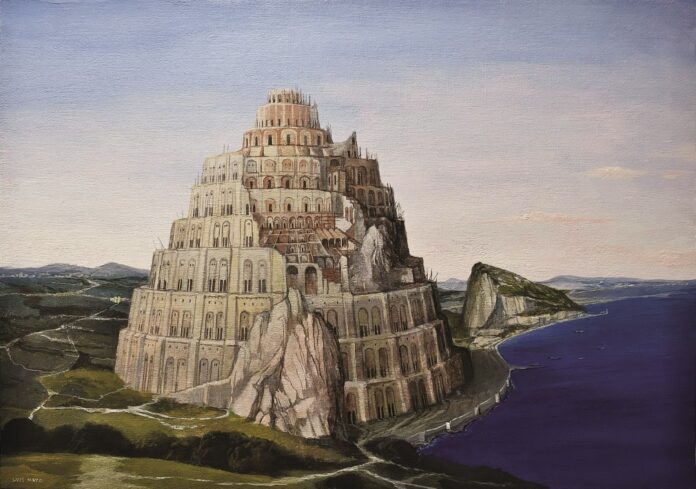When we enter a room with a crowd of people all talking at once, we might describe it as a Babel of voices. We mean there is so much noise and confusion we cannot make out distinctly what anyone is saying. Not everyone is aware that the expression “Babel” is taken from the Bible. It was the name used for a giant building, constructed after the Flood by the descendants of Noah. The story of the Tower of Babel is contained in the eleventh chapter of Genesis, and it will repay our attention because the circumstances of the building of this great edifice have tended to repeat themselves in the long history of humanity.
When the waters of the Flood had dried away, Noah’s sons went back to their farming and building. Their families grew rapidly, and they spread into the fertile river plains alongside the Tigris and the Euphrates in the land of Mesopotamia. Soon the Flood would have been only a memory—a horror story that would be recalled with a shudder, but growing yearly more remote and faint. As time went on, and there was no sign of a renewed judgement from God, that stubborn streak of rebellion which taints all human hearts began to revive. God had crushed the old world for ever, but now humankind was growing in numbers again, and they were feeling strong:
As people migrated from the east, they found a plain in the land of Shinar and settled there… Then they said, “Come, let us build ourselves a city and a tower with its top in the heavens, and let us make a name for ourselves, lest we be dispersed over the face of the whole earth” (Genesis:11:2, 4).
Making Their Mark
For the first time ever, all the families of the earth combined their forces in a giant building project that would really make a mark on history. It was to be a symbol of humanity’s pride and greatness. Plans were drawn up by the best brains of the day, and the materials chosen: ‘They said to one another, “Come, let us make bricks, and burn them thoroughly.” And they had brick for stone, and bitumen for mortar (v. 3). It must have been a major task to organise the vast work teams—a far cry from the lonely work of Noah, building his ark. But the will was there, the difficulties were overcome, and soon the great city and its tower began to creep up into the sky.
Now, we can make some observations straight away. Firstly, Shinar has been the site of human occupation from the very earliest times. It is a flat place, and archaeologists have shown it was once a fertile alluvial plain, lavishly watered from the two great rivers Tigris and Euphrates. The nearest mountains were over 200 miles away. Without easy access to stone, it is not surprising that the builders should turn to brick. Archaeology confirms that clay bricks were the standard building material at Ur and Erech, two other great cities which later dotted this land. The great Ziggurat tower at Ur, one of the oldest man-made structures in the world, and a staggering 1200 feet by 600 feet (365 metres by 182 metres) at the base, is constructed entirely of millions of bricks. Clay was universal—even letters and books were made from clay tablets, inscribed with a stylus and baked indelibly hard.
Then we must consider the purpose of the city and its tower. In a flat land, an artificial mountain would be a great landmark. The building of huge towers or ziggurats was a feature of the later cities of this region. Nebuchadnezzar, king of Babylon in the 6th Century bc, excelled at it. One of his towers is known to have been eight storeys high.
‘Let us make a name for ourselves’ was the cry that united the Babel builders. They were going to build a mighty monument to humanity. Perhaps they thought their city would be impregnable against another flood. Perhaps their tower with its top in the heavens was an attempt to defy the God who lived there, as if they were going to climb up and show Him a thing or two.
To Be Like God
This picture of all the families of the earth slaving away to build a tower to reach up to heaven by their own efforts may seem amusing, until we think of the sombre overtones of the message. To be like God, was the earliest craving of humans (Genesis 3:5). Eve tried to get there the easy way, by eating the forbidden fruit. And millions of hopefuls since have tried to construct their own bridge into God’s presence. We can be like God. We can know good and evil, and live for ever. But it can only be on God’s terms, and by His grace. As Jesus himself said, ‘No one has ascended into heaven’ (John 3:13). Our own efforts are futile. We have to humble ourselves and bend our will to the will of God. It is He who reaches down to lift us up.
Jacob, the forefather of the Jews, once had a vision of a ladder stretching from heaven to earth, with angelic beings going up and down upon it (Genesis 28:10–22). Jesus, probably referring to this vision, told one of his earliest disciples that the angels would ascend and descend upon the Son of man (John 1:51). He was the bridge from heaven to earth. If we have faith in his sacrifice, God will one day build us into a great and holy city, a temple made without hands, in which He will dwell for eternity (Ephesians 2:19–22). But as Paul insists, it will not be our doing. ‘It is the gift of God, not a result of works, so that no one may boast’ (vs. 8–9). So, the mighty city and tower of which the Babel builders were so proud, had to be brought to nothing, as a lesson for future ages.
God Intervenes
The manner of its fall was most unusual. ‘And the Lord came down to see the city and the tower, which the children of man had built’ (Genesis 11:5). How did God come down? Later in the Genesis account we meet the angels of God, those messengers by which He controls the world in which we live. Three angels were sent to investigate Sodom and Gomorrah, in the time of Abraham. They are called ‘the watchers’ in Daniel chapter 4. Zechariah styles them ‘the eyes of the Lord, which range through the whole earth’ (Zechariah 4:10).
We are used nowadays to the satellites which pass miles overhead, photographing in detail the buildings and people of the countries beneath them. But from the beginning of the world, God has been watching men, weighing up their actions, and noting their motives and their plans. Even the darkness is no cloak from his scrutiny, as the Psalmist had to confess (Psalm 139:12). It is a sobering thought that the stranger we pass in the street could be an angel of the Lord, sent to check on the moral condition of our town. What does he think of us? What does God think of you and me? If we are wise, we shall live so that we shall not be ashamed when He does ‘come down’, in the Day of Judgement that will really shake our world (Matthew 12:36).
At any rate, the report of the watchers who came to Babel was not good. ‘This is only the beginning of what they will do,’ was the verdict. ‘And nothing that they propose to do will now be impossible for them’ (Genesis 11:6). The rebellion had to be nipped in the bud. See how easily the messengers of the Lord coped with the emergency. The descendants of Noah had kept together up to now, and all spoke the same language. ‘Come, let us go down,’ said the angels, ‘and there confuse their language, so that they may not understand one another’s speech’ (v. 7).
In an instant, that power which was to be used in New Testament times to give Galilean fishermen the ability to speak many languages (Acts 2:4–11) was used to separate out the families of humankind. They began to speak in different languages, and so were unable to coordinate the building work. They left off building the city. ‘Therefore its name was called Babel, because there the Lord confused the language of all the earth’ (Genesis 11:9).
The Language Barrier
Gradually the families drifted apart. The Semites, the Hamites and the descendants of Japheth moved away and gave rise to the multitude of nations and languages that now fill the earth. Slowly the half-finished tower crumbled into ruins and was forgotten.
That slender natural barrier of language has caused lasting strife and mistrust. Even today, when swift transport and translation apps help us to understand how the rest of the world lives, the absence of a universal language hampers trade and fosters disagreements.
Did nations ever sink their differences again and work together on one united project like they did at Babel? Surprisingly, the answer is ”Yes”. It happened nearly 2000 years ago at the death of Jesus of Nazareth. As Jesus’ disciples in Jerusalem said in their prayer to God, ‘Truly in this city there were gathered together against your holy servant Jesus, whom you anointed, both Herod and Pontius Pilate, along with the Gentiles and the peoples of Israel’ (Acts 4:27). They combined forces to get rid of the Son of God. Their hostility was so strong it broke down the barriers of language and culture. They wrote the accusation over Jesus’ cross in three languages (John 19:20) so that despite Babel, everyone would understand.
The Great Rebellion
That is not quite the end of the story. The Bible shows that yet once more the nations will join hands in common cause. They will join together against Christ at his second coming, just like they did at the first. ‘The kings of the earth set themselves, and the rulers take counsel together, against the Lord and against his Anointed,’ prophesied the Psalmist (Psalm 2:2). But this time he will ‘break them with a rod of iron and dash them in pieces like a potter’s vessel’ (v. 9). A multitude of nations will surround Jerusalem, God’s holy city, and for a while they will feel they are just as strong as the Lord himself (Zechariah 14:1–2). The prophet Isaiah described the attitude of God’s enemies when he condemned the King of Babylon for boasting about his prowess (Babylon was built in the same region as Babel): ‘I will ascend to heaven; above the stars of God I will set my throne on high; I will sit on the mount of assembly in the far reaches of the north; I will ascend above the heights of the clouds; I will make myself like the Most High’
(Isaiah 14:13–14).
The outcome is certain—the Kingdom of God. When those who refuse to have Christ as their king have been punished, and his enemies have been ‘put under his feet’ (Psalm 8:6), Jesus will reign over the earth as king. Then at last the confusion of Babel will be ended for ever, and people will worship God in unity and peace. ‘My decision is to gather nations, to assemble kingdoms, to pour out upon them my indignation,’ writes the prophet Zephaniah. He concludes, ‘For at that time I will change the speech of the peoples to a pure speech, that all of them may call upon the name of the Lord and serve him with one accord’ (Zephaniah 3:8–9).
David Pearce
(to be continued)




